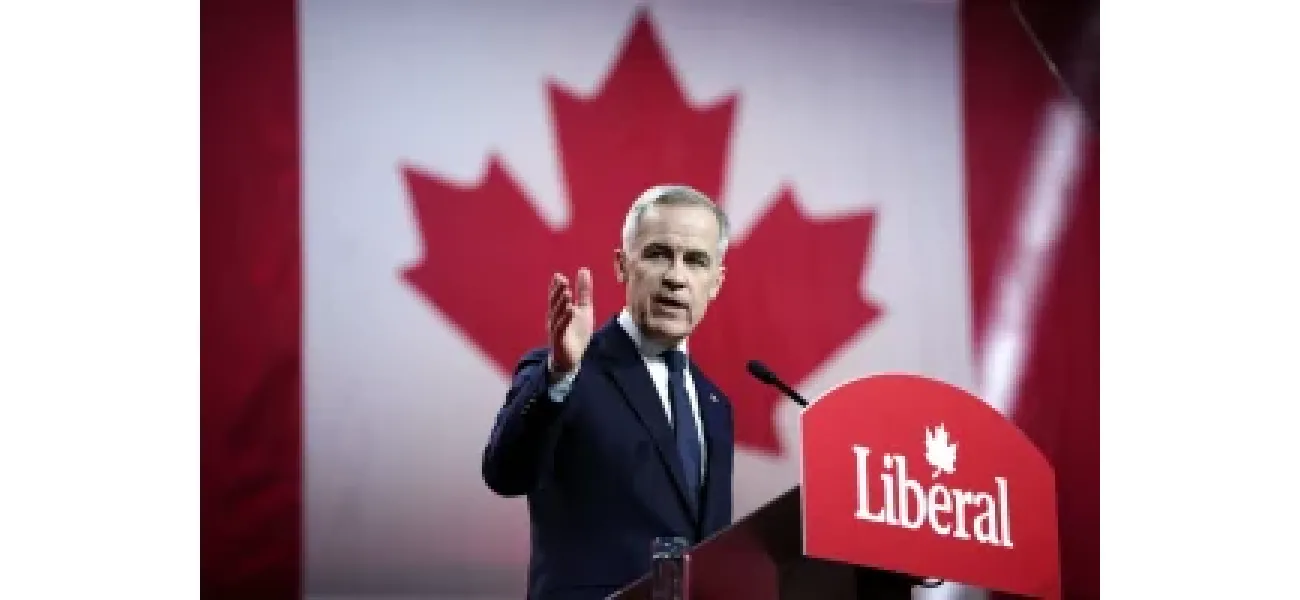A triumphant win with energy and passion.
Trump's threat to make Canada the 51st state has helped PM Mark Carney and the Liberal Party win the Canadian election.
April 30th 2025.

In a twist of fate, the threat made by US President Donald Trump to merge Canada with the United States has actually played a key role in the surprising victory of Prime Minister Mark Carney and the Liberal Party in the recent Canadian election. Carney's Centre-Left party experienced a reversal of fortune thanks to Trump's bold announcement in January that Canada would become the 51st state of America. This declaration served as Carney's main platform during the election and proved to be a successful strategy. In his victory speech, Carney spoke of Canada's determination to remain independent from America, stating, "President Trump may try to break us, but we will never allow America to own us."
Trump's threat also caused a setback for Pierre Poilievre's Conservative Party, which was initially favored to win due to widespread dissatisfaction with the Canadian economy and the previous Liberal government under Justin Trudeau. However, the past year has seen a trend of incumbent governments across the globe losing power, with parties from all sides of the political spectrum facing defeat. This trend was broken by the Canadian election, where the Liberals managed to oust Trudeau and select Carney as their leader. It is a testament to Carney's skill as a politician that he was able to turn Trump's threat into an advantage and rally the voters behind him, despite the Liberal Party's declining popularity before Trudeau's resignation.
Carney's victory marks the beginning of a divergence in the political and policy interests of Canada and the US under Trump's administration. There are already signs that Canada is seeking to strengthen its relationship with Europe rather than relying on America. However, Carney's true test will come in the next few days as he has promised to swiftly negotiate new trade deals with Trump in an effort to prevent US tariffs on Canadian auto exports, which are set to take effect in May. The Canadian economy heavily relies on exports to the US and would be greatly impacted if a full-scale trade war were to occur. Carney, an economist and experienced central banker, has assured voters that he will do everything possible to prevent Canada from slipping into a recession.
It is perplexing how Trump continued to threaten to merge Canada with the US while Canadians were casting their votes on April 28. He even went as far as calling the US-Canadian border "artificially drawn" and claimed that Canada would benefit from becoming a "cherished" American state. Carney's sudden rise to power comes at a critical time for Canada, as it faces an unprecedented challenge from its superpower neighbor. The idea of the US and Canada becoming estranged from each other would have been deemed impossible just six months ago.
Interestingly, following the Liberal Party's re-election, China's foreign ministry spokesperson expressed a desire to develop stronger relations with Canada based on mutual respect, equality, and benefit. It is clear that China will try to exploit the tension between Canada and the US in order to establish a dominant presence in North America.
The defeat of Jagmeet Singh, leader of Canada's New Democratic Party and a pro-Khalistan activist, is seen as a positive development for India as it presents an opportunity to reset diplomatic and trade relations that were strained by accusations from both Singh and Trudeau of Indian involvement in the killing of a Khalistani activist.
Overall, the resounding victory of the Liberal Party in Canada is a source of hope for the international community during a time of increasing global tension. With Trump's attempts to establish a new world order and a rise in hatred and intolerance on the global political stage, the Canadian election serves as a reminder that positive change can still be achieved through determination and perseverance.
Trump's threat also caused a setback for Pierre Poilievre's Conservative Party, which was initially favored to win due to widespread dissatisfaction with the Canadian economy and the previous Liberal government under Justin Trudeau. However, the past year has seen a trend of incumbent governments across the globe losing power, with parties from all sides of the political spectrum facing defeat. This trend was broken by the Canadian election, where the Liberals managed to oust Trudeau and select Carney as their leader. It is a testament to Carney's skill as a politician that he was able to turn Trump's threat into an advantage and rally the voters behind him, despite the Liberal Party's declining popularity before Trudeau's resignation.
Carney's victory marks the beginning of a divergence in the political and policy interests of Canada and the US under Trump's administration. There are already signs that Canada is seeking to strengthen its relationship with Europe rather than relying on America. However, Carney's true test will come in the next few days as he has promised to swiftly negotiate new trade deals with Trump in an effort to prevent US tariffs on Canadian auto exports, which are set to take effect in May. The Canadian economy heavily relies on exports to the US and would be greatly impacted if a full-scale trade war were to occur. Carney, an economist and experienced central banker, has assured voters that he will do everything possible to prevent Canada from slipping into a recession.
It is perplexing how Trump continued to threaten to merge Canada with the US while Canadians were casting their votes on April 28. He even went as far as calling the US-Canadian border "artificially drawn" and claimed that Canada would benefit from becoming a "cherished" American state. Carney's sudden rise to power comes at a critical time for Canada, as it faces an unprecedented challenge from its superpower neighbor. The idea of the US and Canada becoming estranged from each other would have been deemed impossible just six months ago.
Interestingly, following the Liberal Party's re-election, China's foreign ministry spokesperson expressed a desire to develop stronger relations with Canada based on mutual respect, equality, and benefit. It is clear that China will try to exploit the tension between Canada and the US in order to establish a dominant presence in North America.
The defeat of Jagmeet Singh, leader of Canada's New Democratic Party and a pro-Khalistan activist, is seen as a positive development for India as it presents an opportunity to reset diplomatic and trade relations that were strained by accusations from both Singh and Trudeau of Indian involvement in the killing of a Khalistani activist.
Overall, the resounding victory of the Liberal Party in Canada is a source of hope for the international community during a time of increasing global tension. With Trump's attempts to establish a new world order and a rise in hatred and intolerance on the global political stage, the Canadian election serves as a reminder that positive change can still be achieved through determination and perseverance.
[This article has been trending online recently and has been generated with AI. Your feed is customized.]
[Generative AI is experimental.]
0
0
Submit Comment





